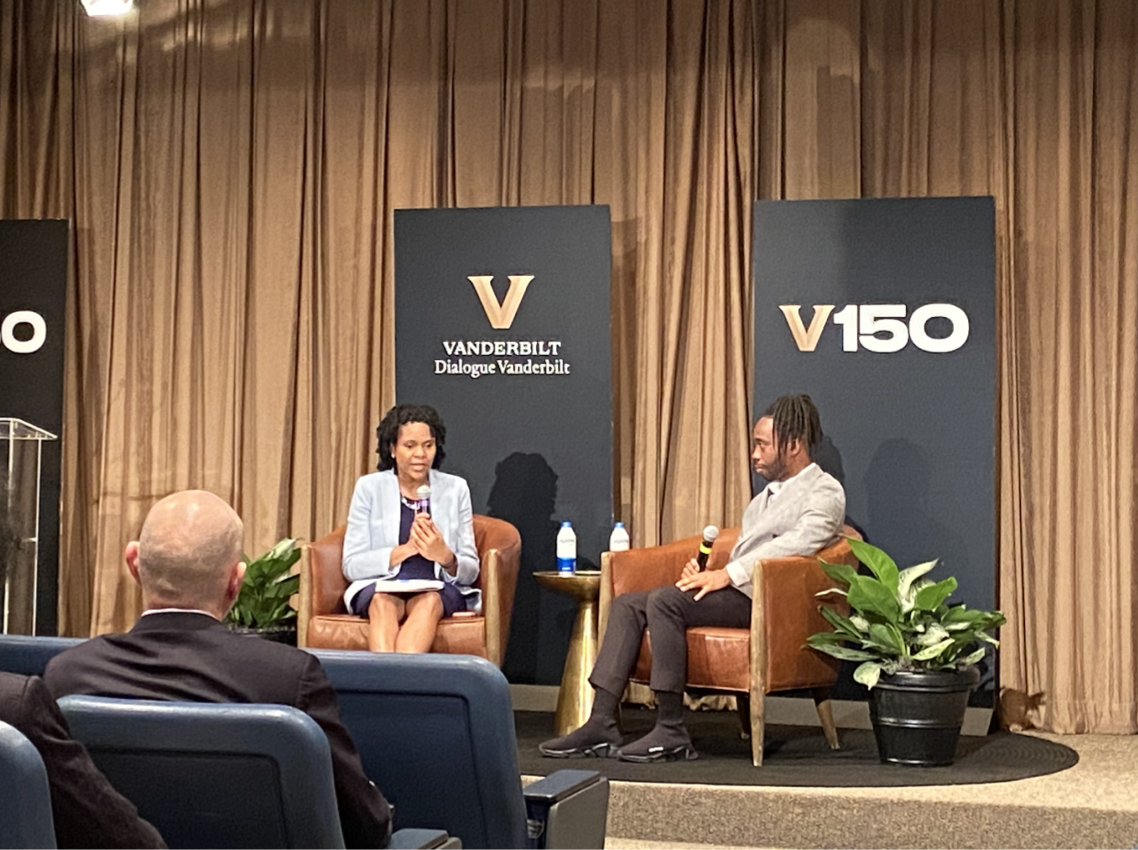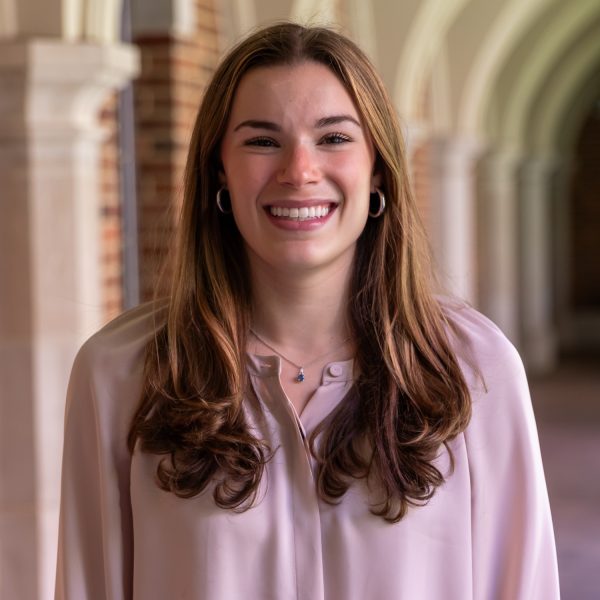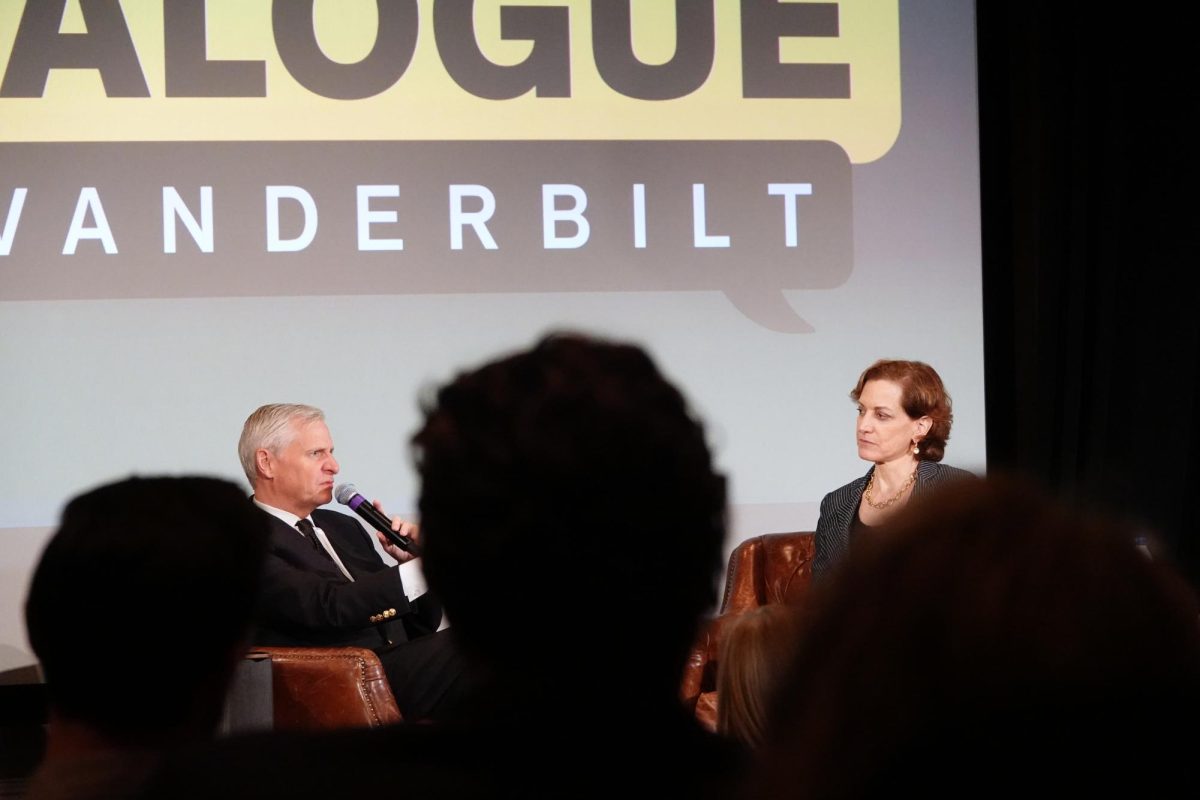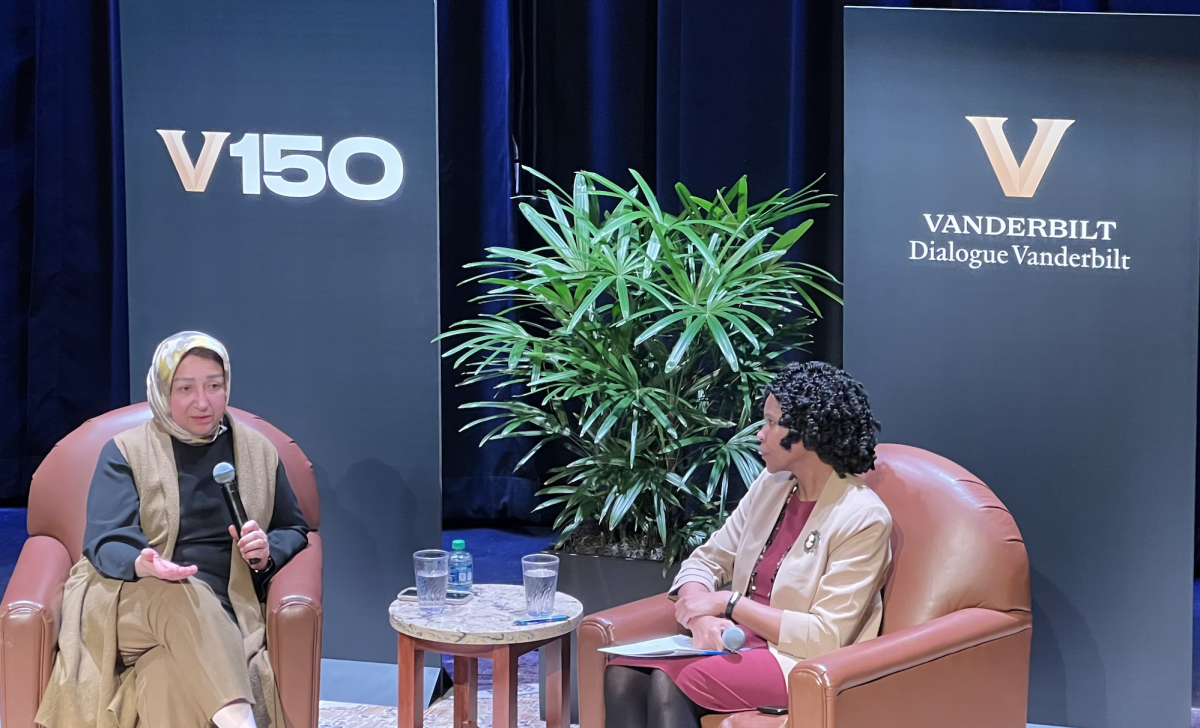Dialogue Vanderbilt hosted Don Abram, founder of Pride in the Pews, for a conversation with Divinity School Dean Yolanda Pierce in the John Seigenthaler Center on March 7. Abram spoke on his experience as a queer person in the Black church and his work in amplifying LGBTQ+ voices in religious spaces.
Abram, who graduated in 2019 with a master of divinity from Harvard Divinity School, founded Pride in the Pews in 2021. The organization strives to bridge the divide between the Black church and LGBTQ+ community through storytelling, political education and civic engagement. Abram said he views scripture from a perspective of Black liberation theology, which aims to disentangle homophobic theologies from religious texts.
Provost C. Cybele Raver opened the conversation by discussing the overall importance of Dialogue Vanderbilt and lauding Abram for setting a “compelling example of debate and dissent.”
“I really love Dialogue Vanderbilt because it’s so focused on timeliness and what we need to know right now — whether it be interpreting a biblical text or federal law,” Raver said. “[Abram] demonstrates the courage that it requires to lean in to simultaneously embracing and changing the organizations and communities with whom we disagree.”
Personal experiences with religion
Abram began by discussing his relationship with religion and commitment to conversations on faith despite its divisiveness in contemporary society. He said he views religion as a way to express what he described as his “spiritual inheritance.”
“My queer and trans ancestors gathered in what scholars call the invisible institution, where they gathered around their faith convictions to bridle hope to foster community and challenge the systems of oppression,” Abram said. “That signals to me that there’s something precious and sacred [about religion].”
While he grew up as a devoted Christian, Abram said he struggled to rectify his identity with the teachings of the church.
“I knew that I could not embody the truth of my queerness and my calling at the same time,” Abram said. “I didn’t think I had the power to question…[and] to critique certain theological interpretations.”
Abram’s questioning about religion led him to pursue a master of divinity degree, which he said offered him a space to challenge preconceived notions about Christian faith and the Black church.
“It wasn’t until I arrived at Harvard Divinity School where I was able to unpack toxic theologies, which are rooted in the dehumanization of those we see as other,” Abram said. “[At Harvard], I was able to reconstruct a theology that allowed me to take ownership of my faith.”
Reconstructing religious beliefs
In response to Pierce’s question of what undergirds his religious reconstruction, Abram said that he has reexamined and reclaimed Black church history and rhetoric to make religion an inclusive space for marginalized groups.
“The Black church has always been queer. It has always been at odds with the world around it,” Abram said. “It has always been the place where my ancestors yearn[ed] for an alternative way of thinking that acknowledged their humanity… we’ve always been fighting systems of oppression.”
Abram further explained that the Black church is not innately hateful towards the LGBTQ+ community, but that such marginalization is a learned behavior from other facets of Christianity.
“One of the things that I like to bring up is that homophobia and transphobia are a byproduct of slaveholding Christianity and white colonial Christianity, which suggest that Black life is disposable,” Abram said. “I like to remind folks that I’m in conversation with that this is not our legacy. We have grounded our faith traditions in the fearless pursuit of liberation.”
Forming Pride in the Pews
A $40,000 grant and storytelling project called “Can I get a witness?” jumpstarted Abram’s organization, Pride in the Pews.
“We collected 66 Black, LGBTQ+ Christian stories, and that’s because there are 66 books in the Christian canonical text. We wanted to articulate that in the same way we see this text as sacred, we should see stories of queer and trans people as sacred,” Abram said.
Abram added that testimonials he collected served not only as stories but also as research to gauge how Black queer people fare emotionally and mentally in the church.
“When we hired qualitative researchers to help us dig through that data, we found that some themes emerged. A vast majority of participants that we spoke to suffered from suicidal ideation, anxiety and social isolation,” Abram said.
Abram clarified that Pride in the Pews is not meant to be an evangelist organization but rather one that affirms and celebrates the existence of marginalized groups in religious organizations.
“I am not an evangelist for coming back to the Black church, because I believe that you can be a part of the Black church without attending the Black church,” Abram said. “The church is not about the place or the building. It’s about the values that are expressed and embodied among those who attend,” Abram said.
Addressing human rights in religion
Pierce highlighted Abram’s work to make the Black church an inclusive space for the LGBTQ+ community and asked Abram how he responds to anti-human rights policies that appear both in churches and religious texts. He said believers have a “moral and spiritual responsibility” to advocate for the church’s marginalized groups.
“Indisputably, as a Christian, [the Bible] is implicated, leveraged and weaponized against queer and trans people,” Abram said.
Abram said this responsibility to stand up for others is a Christ-like principle that he believes carries over to politics and everyday life.
“Whenever scripture is being used in the state legislature to condone the sort of criminalization of queer and trans people, we must ask ourselves: Why is it that we are intent on being stone throwers, instead of being stone catchers? I think I have a moral responsibility to be a stone catcher and recognize that I share kinship with those who are being oppressed,” Abram said.
Audience Q&A
An audience member asked Abram how he engages in conversation with congregations who may not share his viewpoints but remain interested in his ideas.
“It’s important to note that currently zero out of eight historically Black Christian traditions affirm LGBTQ+ communities,” Abram said. “So here I am, saying that I want to engage with the Black church around this issue [of homophobia]. And so the vast majority of the work I do is with people who disagree with me.”
Abram added that despite disagreements between and among congregations, he finds value and “power” in starting open dialogue and building relationships over time.
“I once hosted an event for World AIDS Day in a Black church on the south side of Chicago. We invited the congregation to have a conversation [about LGBTQ+ victims], and the head of the deacon board of the church was so moved that he reconciled with his gay nephew, whom he was estranged from for 10 years,” Abram said.
Another audience member asked about Abram’s views on Christianity being the absolute truth and how he reconciled the contradiction of his personal experiences with the Bible. Abram said he feels it is important to approach the Bible with a critical lens, especially when interpreting specific scriptures.
“I like to hold space for the Bible to contradict itself, and it is from that premise that I engage in ideas of truth,” Abram said. “I acknowledge that I am a part of a spiritual tradition that often refuted theologies which questioned our humanity. That spiritual tradition compels me to reject Biblical passages and interpretations which suggest that God does not love me.”
Abrams connected his interpretation of the Bible with that of his ancestral roots, connection to the Black church and his identity as a queer Black Christian.
“I have to fundamentally reject certain [biblical] ideals in ways that are in service of what I believe to be liberation, freedom and connection with the Divine in capacious, broad ways,” Abrams said. “Just like my ancestors refused to be dehumanized by problematic interpretations of scripture, I take on that same disposition and refuse to subscribe to that as well.”
















